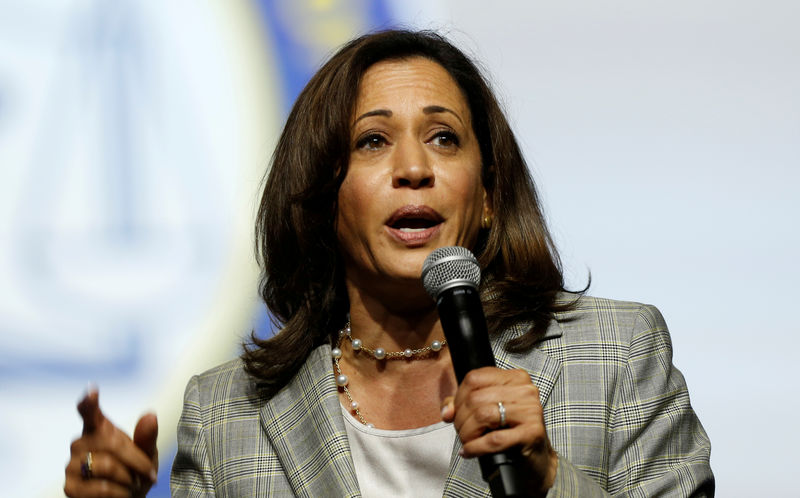By Sharon Bernstein
(Reuters) - Democratic presidential hopeful Kamala Harris on Friday unveiled a plan to invest $60 billion in historically black colleges and universities if elected, the latest effort by the U.S. senator from California to reach out to black voters.
She also released a plan to spend $12 billion on entrepreneurship programs aimed at the black community, her campaign said.
Harris is one of two dozen contenders in a field led by former Vice President Joe Biden seeking the Democratic nomination to challenge Republican President Donald Trump in the November 2020 election.
The daughter of immigrants from Jamaica and India, Harris has consistently polled behind Biden among black voters.
At last month's Democratic nominating contest debate, Harris took on Biden, who is white, over issues of race, and was rewarded with a bump in the polls.
Harris' plan, released during a speech before the National Urban League conference in Indianapolis, seeks to bolster science and technology education for historically black colleges and universities, or HBCUs, as well as other minority-serving institutions.
It would create a $10 billion grant fund to build laboratories and other infrastructure, and $50 billion to fund scholarships, internships and curriculum for so-called STEM classes, involving science, technology, engineering and mathematics.
Harris is a graduate of Howard University in Washington, one of the best-known U.S. historically black colleges and universities.
Citing data showing African Americans are more likely to rely on credit cards than bank loans when starting businesses and are often offered smaller loans at higher interest rates than whites, Harris' plan would establish a grant program for black-owned startup businesses.
It would also establish a student loan forgiveness program for entrepreneurs who operate in disadvantaged communities for three years.
“By taking these challenges on, we don’t just move Black America forward, we move all of America forward,” Harris said.
On Tuesday, Biden unveiled a plan to overhaul the U.S. criminal justice system by lowering incarceration rates, ending the federal death penalty and eliminating racial disparities in how people are sentenced..
The former U.S. senator from Delaware has been criticized over his support for a 1994 crime bill that some say contributed to mass incarceration, especially of black men.
A Monmouth University poll released on Thursday showed Harris trailing far behind Biden among black voters in the early primary-election state of South Carolina, which has a large African-American electorate.

Just 12% of black respondents supported Harris, versus 51% for Biden, who was vice president under Barack Obama, America's first black president.